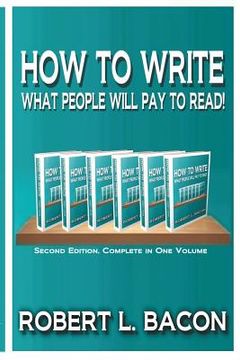Share
How to Write What People Will Pay to Read!
Robert L. Bacon
(Author)
·
Createspace Independent Publishing Platform
· Paperback
How to Write What People Will Pay to Read! - Bacon, Robert L.
Choose the list to add your product or create one New List
✓ Product added successfully to the Wishlist.
Go to My Wishlists
Origin: U.S.A.
(Import costs included in the price)
It will be shipped from our warehouse between
Wednesday, July 24 and
Wednesday, July 31.
You will receive it anywhere in United Kingdom between 1 and 3 business days after shipment.
Synopsis "How to Write What People Will Pay to Read!"
No-nonsense, concise answers to hundreds of writing and publishing issues you must know so people will pay to read your book! Action Does Not Always Constitute Plot Movement. Action That Does Not Advance the Plot. Adjectives--Their Overuse. Adverbs--When They Should and Should Not Be Used In a Narrative. Backstory (Flashback) in a Narrative--Three Effective Techniques Other Than Dialogue. Backstory--How to Write It. Chapter Length--Why Consistency Is Important. Characters Significant to the Plot Must Change for the Story to Be Effective. Classic Authors' Styles. Comma Usage. Conflict--Its Meaning and Significance. Contractions and Their Use to Create More Fluent Dialogue. Contrivance Issues. Dangling Modifiers. Dashes Defined By Variety and Application. Derogatory Material--Issues to Consider. Description in a Narrative--When Is There Too Much Information? Developmental Arcs. Dialogue--How Not to Begin It In a Novel. Dialogue--Interior Attributes That Are Unnecessary. Dialogue Techniques To Remedy the Overuse of Speaker Attributes. Dialogue to Enhance Characterization. Dialogue to Enhance Pacing. The Five Most Common Errors an Editor Sees. Ellipsis Use--What Is Correct. Ending a Story Effectively--The Value of Setting Up a Storyboard. Etymology and Its Importance When Writing Period Material. Fiction Writing Techniques Defined in Literary Classics. Fleshing Out a Character. Fleshing Out a Scene. Gerunds and Gerund Phrases. Literature Written by These Four Authors Defined the Craft of Writing Perfect Prose. Metaphor Use. Narrative Fluff. Nonfiction or Fiction As a Category--If Some Aspect of a Book Is True, Which Is It? Novel Length--What Is Correct for Each Genre. Opening Chapter--Writing a Powerful Hook Is Essential. How to Write the Perfect Paragraph. Paragraph Length in a Novel. Plot Authenticity. Plot Believability. Plot Elements Should Not Be Revealed Prematurely. Plot Holes--How They Can Destroy a Story .Point of View in Writing--a Clear Definition with Techniques for Effective Shifts. Political Correctness. Profanity in a Novel--What Works in Which Genres. Prologues. Pronouns That Foster Incorrect Linkage. Parentheses in Fiction. Punctuation. Effectively Using the Semicolon. The Exclamation Point. Redemptive Characters. Redundancy Issues--Alliteration, Sibilance, and Repetitious Alphabet. Restrictive and Nonrestrictive Clauses. Showing vs. Telling Defined. Simile Use. Simple Word Revisions That Can Dramatically Improve the Narrative of Any Story. Sound in Writing. Spelling and Word Meanings in the U.S. That Differ in the U.K. Starting the Story Sooner. Tautology Defined. "That"--Its Overuse, Underuse, and Misuse. The "Chase." The "Reveal." Threads and Methods for Tying Up Plot Elements. Tic Definition and Examples. Time and Distance. Timeline Gaps. Coming Up With A Great Name for a Story. Transitioning. Villains--How Bad Can They Be? Voice--Active vs. Passive. Voice--What Does It Mean?. Word Consistency in a Manuscript. Words That Define in Absolute Terms. Copyrighted Material--How to Gain Permission for Use. Critique Groups. The Various Services Editors Provide. Fair Use and Copyright Infringement. Formatting a Manuscript For Agents and Publishers. Understanding Genre When Querying Agents. ISBN System Explained in Detail. Listing a Manuscript with Ingram, Baker & Taylor, and Amazon. Literature Defined As a Genre. Manuscript Evaluations--What Publishers Consider. Publishers--Large vs. Small. Query Letter Writing--Finding the Perfect Agent for Your Novel. The Query Letter Dissected. Query Letter Writing and What Not To Include in the Content. Query Writing Is Different from Writing a Synopsis. Revision Suggestions and How to Deal With Them Effectively. Screenplay Writing--Turning a Book Into a Screenplay, and the Cold, Hard Facts About Options. Voice--Maintaining the Author's Voice When Editing. Word Count for a Novel and How It Applies to Genre. Writing New Material--When It's Time to Write Something Else.
- 0% (0)
- 0% (0)
- 0% (0)
- 0% (0)
- 0% (0)
All books in our catalog are Original.
The book is written in English.
The binding of this edition is Paperback.
✓ Producto agregado correctamente al carro, Ir a Pagar.

